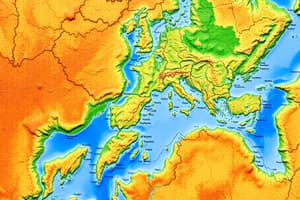Podcast
Questions and Answers
What does physical geography primarily focus on?
What does physical geography primarily focus on?
- Natural features like landforms and climate (correct)
- Geospatial technologies and mapping
- Human activities and their cultural implications
- Economic systems and urban development
What is the term used for areas defined by distinct climate or cultural features?
What is the term used for areas defined by distinct climate or cultural features?
- Region (correct)
- Movement
- Location
- Place
Which tool is essential for analyzing spatial data in geography?
Which tool is essential for analyzing spatial data in geography?
- Remote Sensing
- Geographic Information Systems (GIS) (correct)
- Thematic Maps
- Climate Models
Which theme in geography addresses social justice and environmental inequality?
Which theme in geography addresses social justice and environmental inequality?
What does the concept of 'human-environment interaction' encompass?
What does the concept of 'human-environment interaction' encompass?
Which of the following is NOT a major geographic region?
Which of the following is NOT a major geographic region?
What process is involved in the studies of human geography?
What process is involved in the studies of human geography?
Which of the following tools helps in acquiring information about an area from a distance?
Which of the following tools helps in acquiring information about an area from a distance?
Flashcards are hidden until you start studying
Study Notes
Definition of Geography
- Study of the Earth's landscapes, environments, and the relationships between people and their environments.
- Involves understanding spatial patterns and processes.
Branches of Geography
-
Physical Geography
- Focuses on natural features: landforms, climate, ecosystems, and biomes.
- Studies processes such as plate tectonics, weathering, and erosion.
-
Human Geography
- Examines human activities and their relationship with the environment.
- Topics include urban development, population, culture, and economic systems.
-
Geographical Techniques
- Use of tools and technologies such as GIS (Geographic Information Systems), remote sensing, and cartography.
- Analyzes spatial data to understand geographical phenomena.
Key Concepts in Geography
- Location:
- Absolute (latitude and longitude) and relative (describing a location in relation to others).
- Place:
- Characteristics that make a location unique (cultural, physical).
- Region:
- Areas defined by distinct climate, geography, political, or cultural features.
- Movement:
- How people, goods, and ideas move from one location to another.
- Human-Environment Interaction:
- Ways humans adapt to, modify, and depend on their environment.
Tools and Resources
- Maps
- Represent spatial information visually; types include topographic, thematic, and political.
- GIS (Geographic Information Systems)
- A system for capturing, storing, analyzing, and managing spatial data.
- Remote Sensing
- Acquisition of information about an object or area from a distance, typically using satellites or aircraft.
Current Trends in Geography
- Impact of climate change on physical and human systems.
- Urbanization and its geographic implications.
- Globalization and interconnectedness of economies and cultures.
- Geospatial technology advancements and their applications.
Important Themes
- Sustainability and conservation of natural resources.
- Social justice and environmental inequality.
- Global interdependence and geopolitics.
Major Geographic Regions
- Continents: Africa, Antarctica, Asia, Europe, North America, Australia, South America.
- Major Biomes: Tundra, Taiga, Temperate Forest, Desert, Grassland, Tropical Rainforest.
- Key River Systems: Amazon, Nile, Yangtze, Mississippi.
This concise overview encapsulates the fundamental aspects of geography across its branches, concepts, tools, trends, and regions.
Definition of Geography
- Geography investigates Earth's landscapes, environments, and the connections between people and their surroundings.
- It explores spatial patterns and processes.
Branches of Geography
- Physical Geography focuses on natural aspects of the Earth:
- Landforms
- Climate
- Ecosystems
- Biomes
- Processes like plate tectonics, weathering, and erosion.
- Human Geography studies human activities and interactions with their environments:
- Urban development
- Population distribution
- Cultural variations
- Economic systems
- Geographical Techniques utilize various tools and technologies like:
- GIS (Geographic Information Systems)
- Remote sensing
- Cartography
- Used to analyze spatial data and understand geographical phenomena.
Key Concepts in Geography
- Location:
- Absolute location: Using coordinates (latitude and longitude)
- Relative location: Describing a place in relation to others.
- Place:
- Refers to the unique characteristics of a specific location, including:
- Cultural elements
- Physical features.
- Refers to the unique characteristics of a specific location, including:
- Region:
- An area defined by distinct features like:
- Climate
- Geography
- Political boundaries
- Cultural traits.
- An area defined by distinct features like:
- Movement:
- How people, goods, and ideas move from one place to another.
- Human-Environment Interaction:
- How humans adapt to, modify, and depend on their environment.
Tools and Resources of Geography
- Maps:
- Visual representations of spatial information, including:
- Topographic maps
- Thematic maps
- Political maps
- Visual representations of spatial information, including:
- GIS (Geographic Information Systems):
- Captures, stores, analyzes, and manages spatial data.
- Remote Sensing:
- Acquiring information about an object or area from a distance, typically using satellites or aircraft.
Current Trends in Geography
- Climate Change:
- Its impacts on physical and human systems are a significant focus.
- Urbanization:
- Its geographic implications and the rapid growth of cities.
- Globalization:
- The interconnectedness of economies and cultures worldwide.
- Geospatial Technology:
- Advancements in geospatial technologies and their increasing applications.
Important Themes of Geography
- Sustainability:
- Conservation of natural resources.
- Social Justice:
- Addressing environmental inequality.
- Global Interdependence:
- Geopolitics and the interconnectedness of nations.
Major Geographic Regions
- Continents:
- Africa
- Antarctica
- Asia
- Europe
- North America
- Australia
- South America
- Major Biomes:
- Tundra
- Taiga
- Temperate Forest
- Desert
- Grassland
- Tropical Rainforest
- Key River Systems:
- Amazon
- Nile
- Yangtze
- Mississippi.
Studying That Suits You
Use AI to generate personalized quizzes and flashcards to suit your learning preferences.




